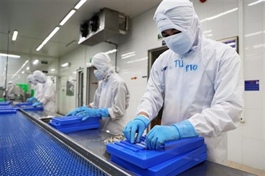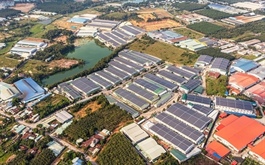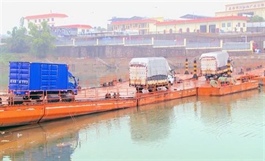Steady rise to goal of carbon neutrality
Steady rise to goal of carbon neutrality
The carbon-neutral investment outlook in Vietnam is expected to be joined by an increased number of both local and overseas players.
At the end of May, for the first time, a dairy farm and a processing facility of Vinamilk in the central province of Nghe An was certified by the British Standards Institute (BSI) to be carbon neutral. The system of heat recovery, biomass energy utilisation, solar power addition, and methane combustion during treating wastewater as synchronous solutions is to be updated regularly to further cut down emissions from Vinamilk’s facility in the central province of Nghe An.
At the same time, Vinamilk also announced its pathway to dairy net-zero by 2050, via hitting 15 per cent in 2027 and 55 per cent in 2035.
“By the end of this year, we will reduce emissions of more than 200 tonnes of carbon gas into the environment compared to 2022. Solar energy contributes 20 per cent of electricity consumption and is going to contribute 50 per cent in the next five years,” said Ngo Cong Thang, director of Vinamilk’s Nghe An facility, who added that the company would plant 2-3 million trees in the next five years.
The total amount of CO2 that the business neutralises exceeds 17,500 tonnes, equivalent to planting 1.7 million new trees.
Luu Thi Mai Huong, certification manager at Bureau Veritas Certification Vietnam, said, “In difficult markets like the United States, they all have requirements for their suppliers and goods. However, a good signal is that Vietnamese businesses also volunteer proactively to follow these sustainable standards because it is a trend.”
According to some advisory firms, in Vietnam, only a few dozen businesses have registered to carry out full calculations of carbon emissions into the environment. In fact, only Vinamilk and Dutch lighting company Signify have been officially certified by the BSI as carbon-neutral in this country.
However, more will likely be on the way. On a larger scale, Lego is building a $1-billion project for the first carbon-neutral factory, which is expected to be put into operation next year in the southern province of Binh Duong.
Preben Elnef, Lego Vietnam general manager, said, “By the hands of Vietnamese people, this land will become a factory with a scale equivalent to about 60 football fields, entirely operated by renewable energy. Solar panels can be seen everywhere, and there is a solar farm with a capacity of 50MW. Besides that, we have committed to planting about 50,000 trees.”
Also in Binh Duong, Denmark’s Pandora Group is building a $100-million manufacturing plant for world-class jewellery. The factory is built with LEED Gold standards and uses renewable energy.
Meanwhile, SEP Group from South Korea plans to pour $200 million to establish Vietnam’s first carbon-neutral industrial complex for the footwear industry, and carbon-reducing infrastructure over 180 hectares at Tam Lap 2 industrial cluster in the province’s Phu Giao district. Specifically, SEP carbon-neutral technologies include solar energy, good waste and wastewater treatment systems, and industrial waste recycling technology.
“About 20 members of SEP will participate and invest in carbon-neutral solutions at this project, contributing to reducing greenhouse gas (GHG) emissions and protecting the environment towards sustainable development and the net-zero goal of the Vietnamese government,” said Dong Hoon Hyun, SEP chairman.
Meanwhile, in February, Becamex IDC Corporation and Singaporean industrial developer Sembcorp Development signed an agreement to develop five green, smart, and sustainable industrial parks in Vietnam with a total investment of about $1 billion.
As of this year, manufacturers in Vietnam under a designated list are expected to carry out the periodical inventory of their GHG emissions. In the 2026-2030 period, emission reductions will be implemented according to the quota allocated by the Ministry of Natural Resources and Environment.
If emissions at a manufacturing facility are excessive, they can buy carbon credits and Vietnam will operate a trial carbon credit exchange by 2025, before going into official operation in 2028.






















